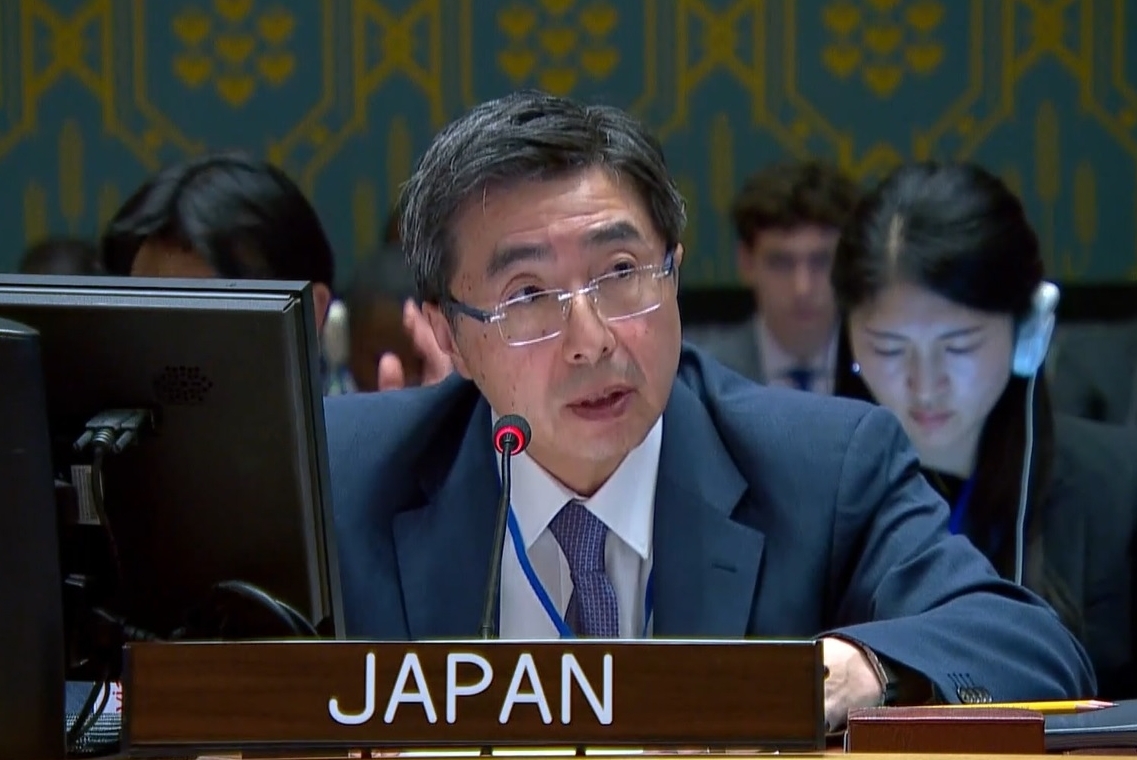国連安保理公開討論「気候変動、平和と安定」における石兼大使ステートメント
令和5年6月13日

(As delivered)
Mr. President,
I thank UAE for holding this important meeting. I also thank USG Lacroix and former President Santos and Ms. Kadry for their valuable inputs.
Climate change is an imminent and critical threat to all countries in various ways. For instance, climate change-induced sea level rise threatens the very existence of SIDS. In Africa, mass flooding, droughts, desertification, and land degradation, to name a few, trigger and exacerbate conflicts, as the Council has recognized. Whatever the impacts are, climate change multiply the risk of conflicts, and then those conflicts make the states more vulnerable to the adverse impacts of climate changes. Japan believes that in order to cut this vicious cycle, the Security Council should squarely address climate security.
Mitigation and adaptation are the main actions that should be taken in preventing the risk and breaking the vicious chain reaction. Enhancing resilience of countries and thereby accelerating robust development in the long run is key. The Council must coordinate and cooperate with all stakeholders holistically among entire UN system and beyond, such as the Peacebuilding Commission (PBC), Economic and Social Council (ECOSOC), Resident Coordinators (RCs) and International Financial Institutions (IFIs). Especially, Japan has consistently called for greater mutual communication between the Council and the PBC.
Japan also believes that the Council should deepen discussions on the rule of law as it ensures transparency and fairness among people and communities. Taking sea level rise as an example, legal stability and predictability are the necessary foundation especially for SIDS as well as for African coastal states that are exposed to various uncertainties due to the sea level rise. In this context, as Prime Minister Kishida articulated in the New Plan for a “Free and Open Indo-Pacific (FOIP)” this March, Japan reiterates its position that it is permissible for coastal countries to preserve the existing baselines and maritime zones established under the UNCLOS, notwithstanding the regression of coastlines caused by climate change.
Mr. President,
Japan will, for its own part, continue to assist in strengthening the resilience of climate-vulnerable groups. Under Japan’s presidency, G7 leaders reaffirmed their commitment to mobilize up to 600 billion US dollars in financing for quality infrastructure through the Partnership for Global Infrastructure Investment (PGII) to tackle challenges including climate change at the Hiroshima summit last month. Among various projects implemented under the PGII, we support capacity-building for SIDS aiming at improving the resilience of their infrastructure to climate change and disaster risk. Japan International Cooperation Agency also launched a Facility for Accelerating Climate Change Resilient and Sustainable Society (ACCESS) of up to 1.5 billion US dollars to finance infrastructure projects by public and private entities which acclerate climate actions.
In conclusion, as has been pointed out by former President of Colombia, “making peace with nature, reconciliation with nature” is an urgent challenge all of need to address. In so doing, strong political will is needed as Ms. Kadry said. We do not have luxury spending time idly, finger pointing others and shifting responsibility to others for whatever motivations. We do not have luxury spending time idly in questioning scientific evidence that prove causal correlations between and climate and security, while actual damages are being done on the ground. Japan reiterates its commitments to continue and strengthen our efforts to counter this global challenge in cooperation with the UN, Member States, and international institutions and other stakeholders including civil societies.
I thank you.
